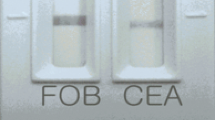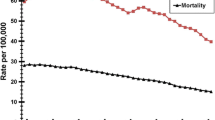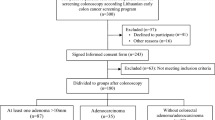Abstract
Anticarcinoembryonic antigen (CEA) antisera which showed no reactions with normal adult feces were prepared in guinea pigs. Using these, levels of CEA in feces from patients with colorectal carcinoma were measured by gel diffusion and rocket immunoelectrophoresis. Sixteen of 22 (73 percent) patients with carcinoma of the colon or rectum (Dukes' A 4/6, B 6/8, C 6/7, D 0/1) had detectable CEA in their feces, while none was detected in the feces of four patients with gastric ulcers or in hose of 22 normal volunteers. Five of the 16 fecal CEA-positive patients showed no elevation of plasma CEA levels. Measurements using a commercial CEA kit (Abbott Laboratories) could not detect the differences between fecal CEA values of patients with colorectal carcinoma and benign diseases, or those of normal volunteers. These results suggest that measurement of fecal CEA by specific anti-CEA antisera will be valuable in screening and diagnosis of colorectal carcinoma.
Similar content being viewed by others
References
Gold P, Freedman SO. Demonstration of tumor-specific antigens in human colonic carcinomata by immunological tolerance and absorption techniques. J Exp Med 1965;121:439–62.
Goldenberg DM, Neville AM, Carter AC, etal. Carcinoembryonic antigen: its role as a marker in the management of cancer. A National Institutes of Health consensus development conference. Ann Intern Med 1981;94:407–9.
von Kleist S, Chavanel G, Burtin P. Identification of an antigen from normal human tissue that crossreacts with the carcinoembryonic antigen. Proc Natl Acad Sci USA 1972;69:2492–4.
Burtin P, Chavanel G, Hirsch-Marie H. Characterization of a second normal antigen that cross-reacts with CEA. J Immunol 1973;111:1926–8.
Matsuoka Y, Hara M, Takatsu K, Kitagawa M. Presence antigen related to the carcinoembryonic antigen in feces of normal adults. Gann 1973;64:203–6.
Mori T, Wakumoto H, Shimano T, Lee P-K, Higashi H. Immunopathological studies on CEA and CEA-associated antigens with reevaluation of the cancer specificities of CEA. AnnNY Acad Sci 1975;259:412–6
Mori T, Shimano T, Lee PK, Fujimoto N, Kosaki G. Antigenic differences of CEA in colonic cancer, gastric cancer and fetal tissues. Scand J Immunol [Suppl] 1978;8:439–46.
Shimano T, Loor RM, Papsidero LD, et al. Isolation, characterization and clinical evaluation of a pancreas cancer-associated antigen. Cancer 1981;47:1602–13.
Hirai H. A collaborative clinical study of carcinoembrhonic antigen in Japan. Cancer Res 1977;37:2267–74
Fujimoto S, Kitsukawa Y, Itoh K. Carcinoembryonic antigen (CEA) in gastric juice or feces as an aid in the diagnosis of gastrointestinal cancer. Ann Surg 1979;189:34–8.
Bunn PA Jr, Cohen MI, Widerlite L, Nugent JL, Matthews MJ, Minna JD. Simultaneous gastric and plasma immunoreactive plasma carcinoembryonic antigen in 108 patients undergoing gastroscopy. Gastroenterology 1979;76:734–41.
Author information
Authors and Affiliations
Additional information
This work was supported in part by a Grant-in-Aid for Cancer Research (No. 60480302) from the Ministry of Education, Science and Culture, Japan.
About this article
Cite this article
Shimano, T., Okuda, H., Monden, T. et al. Usefulness of carcinoembryonic antigen measurement in feces of patients with colorectal cancer. Dis Colon Rectum 30, 607–610 (1987). https://doi.org/10.1007/BF02554807
Received:
Issue Date:
DOI: https://doi.org/10.1007/BF02554807




